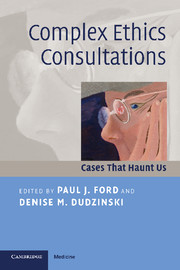Book contents
- Frontmatter
- Contents
- List of contributors
- Foreword
- Acknowledgments
- Introduction: Live and learn: courage, honesty, and vulnerability
- Part I Starting at the beginning: prenatal and neonatal issues
- Part II The most vulnerable of us: pediatrics
- Part III Diversity of desires and limits of liberty: psychiatric and psychological issues
- Part IV Withholding therapy with a twist
- Part V The unspeakable/unassailable: religious and cultural beliefs
- Part VI Human guinea pigs and miracles: clinical innovations and unorthodox treatment
- 21 Amputate my arm, please. I don't want it anymore
- 22 Feuding surrogates, herbal therapies, and a dying patient
- 23 One way out: destination therapy by default
- 24 Altruistic organ donation: Credible? Acceptable?
- Part VII The big picture: organizational issues
- Conclusions, educational activities, and references
- Index
23 - One way out: destination therapy by default
Published online by Cambridge University Press: 03 May 2010
- Frontmatter
- Contents
- List of contributors
- Foreword
- Acknowledgments
- Introduction: Live and learn: courage, honesty, and vulnerability
- Part I Starting at the beginning: prenatal and neonatal issues
- Part II The most vulnerable of us: pediatrics
- Part III Diversity of desires and limits of liberty: psychiatric and psychological issues
- Part IV Withholding therapy with a twist
- Part V The unspeakable/unassailable: religious and cultural beliefs
- Part VI Human guinea pigs and miracles: clinical innovations and unorthodox treatment
- 21 Amputate my arm, please. I don't want it anymore
- 22 Feuding surrogates, herbal therapies, and a dying patient
- 23 One way out: destination therapy by default
- 24 Altruistic organ donation: Credible? Acceptable?
- Part VII The big picture: organizational issues
- Conclusions, educational activities, and references
- Index
Summary
Case narrative
A year before Rose was admitted, Alice (the heart transplant social worker and a clinical ethics consultant) and her team invited Denise (chief of the ethics consultation service and an organizational ethics consultant) to explore the ethical dimensions of a new treatment called destination therapy (DT). The Randomized Evaluation of Mechanical Assistance for Treatment of Congestive Heart Failure (REMATCH) study showed that an LVAD (left ventricular assist device, which is surgically implanted to do the work of a poorly functioning left ventrical) can prolong life and decrease morbidity for patients with advanced cardiac disease who are not candidates for transplant. For this group, the LVAD is “destination” rather than “bridge” therapy. The target population was the estimated 10% of heart failure patients older than 65 with refractory end-stage heart failure, not young patients like Rose. By the time Rose was admitted, the heart transplant team, Alice, and Denise had worked together for months and had drafted ethics guidelines. Unfortunately, these did not help Rose at all.
Rose was a woman in her late 20s with severe cardiomyopathy and very poor cardiac function (ejection fraction <10%). She was admitted to the hospital to receive treatment for congestive heart failure symptoms, including shortness of breath, nausea, vomiting, and general malaise. Because she was so acutely ill, she received an expedited transplant workup that revealed no major medical contraindications but highlighted several psychosocial “red flags” that included a history of substance abuse, previous nonadherence to medical regimen, and lack of insurance and stable social support. Rose frequently missed clinic appointments and did not always take her medicines as prescribed.
- Type
- Chapter
- Information
- Complex Ethics ConsultationsCases that Haunt Us, pp. 179 - 185Publisher: Cambridge University PressPrint publication year: 2008



